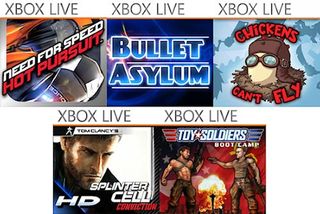How Microsoft can save Xbox games for Windows Phone: Part 4

Remember that huge five week long game drought we just went through? We didn’t get official word from Microsoft until the fourth straight week without a release, after the drought had almost passed (and not for lack of trying on our part). As every week went by, your humble author and most avid Windows Phone gamers became increasingly distressed. The whole situation brought to light the ever-worsening handling of Xbox games for Windows Phone by the platform holder.
It also led to the creation of this very series of editorials about how Xbox games for Windows Phone can be turned around. Microsoft has a wonderful gaming synergy on its hands with Xbox Live and Windows Phone, if only they will make proper use of it. We’ve already explored several ways to do so: overhaul the certification system that’s completely inappropriate for mobile games, get internal forces within Microsoft on the same page about the value of Xbox Live, and then promote Windows Phone directly alongside Xbox consoles.
Today we follow up on that last point by looking at the lack of public relations management that affects mobile Xbox games and makes it difficult for both Windows Phone and Windows 8 developers and publishers to promote their own games.
Windows Phone needs competent and dedicated PR staff focused specifically on Xbox features and games.

KooZac coming to Windows Phone is kind of a big deal, but nobody at Microsoft seems to understand why.
When I talk about PR staff, I refer specifically to the people whose job it is to send out press releases and other Xbox Windows Phone gaming news to the press, respond to articles about the platform and its games, and answer press inquiries. Their goal at the end of the day is to maintain enthusiasm and confidence in the brand and software.
The release drought I just mentioned is the perfect symbol for how little effort Microsoft has put into Xbox Windows Phone PR as of late. Had there been even one full-time Xbox Windows Phone PR person, he or she would surely have contacted the press much sooner in order to calm gamers’ fears. Ideally we’d have been notified before the drought even started and asked to remain patient. It’d be nice to know that Microsoft cares about this audience and doesn’t consider it an afterthought.
Dial time back a bit to 2010 and 2011 and you’ll see much greater evidence of PR care from Microsoft and their third-party PR firm Edelman. In those years, Microsoft regularly announced Xbox Windows Phone games in large batches, either during events like E3 or directly to the media. Sometimes games like Top Gun ended up as vaporware, but at least fans had something to look forward to. What do we know we have to look forward to these days? What improvements are definitely coming?
Get the Windows Central Newsletter
All the latest news, reviews, and guides for Windows and Xbox diehards.
To give you a better idea of the shift in PR attitude and efforts, the last time Microsoft announced more than a single Xbox Windows Phone game was February 2012. We do know of a few more Microsoft-published Xbox games in development: Pinball FX2 (announced February 2012), Ms. Splosion Man (announced April 2012), Ascend: New Gods (announced June 2012), Fairway Solitaire and Temple Run (both quietly announced July-August 2012).
Beyond those long-in-coming titles (the first of which could end up as vaporware) and 12 games that Gameloft announced on its own, we have no idea what Microsoft and third parties have in store for Windows Phone in 2013. Even the release schedule has become haphazard. Microsoft’s partners at Edelman used to let us know about new releases a week in advance, but nowadays we learn about titles one day before release at most. Third party games like KenKen and KooZac just show up, never having been announced in advance (and despite our efforts to maintain relationships with every known Xbox Windows Phone developer).
Longtime readers have probably noticed a drop-off in our Xbox Live Developer Interview series as well. The reason is twofold: one, Microsoft stopped presenting us with interview opportunities - the person responsible shuffled off of Windows Phone without being replaced. The good lady who gave us advance release dates is also gone and sorely missed. Two, so few Xbox Windows Phone games get announced in advance any more that we hardly have anyone to interview even when we reach out on our own.
Sharing is caring, Microsoft.

If you want to know how NOT to promote a game like Big Buck Hunter Pro, just ask Microsoft.
Most of the PR problems I lament stem from budgetary cutbacks and simple negligence. But Microsoft and whatever PR agents do remain are also far too dedicated to the culture of secrecy. Basically, they like to keep an extremely tight leash on how and what information about digital Xbox games get out, even when there is no logical reason to do so. If some detail about a game hasn’t been published on Microsoft’s PlayXBLA blog and Microsoft has any say in the matter, that detail will not be given to the press. Remember, PlayXBLA barely shares any advance information in the first place.
I can’t count how many innocuous questions I’ve asked only to be told no comment or given a wordy non-answer. The best example is when we asked Microsoft directly about Big Buck Hunter Pro in September 2012. The Windows 8 version (still unreleased as of this writing) had already been announced at PlayXBLA a few weeks prior. I sent them 11 questions, including the obvious “Will [this game] come to Windows Phone 8 as well?”
Their response: a refusal to answer any of those questions, although they did send over a description and images of the Windows 8 game. One month later, we received the standard one day advance notice of Big Buck Hunter Pro’s release for Windows Phone. The game was one month away and Microsoft just plain didn’t want anybody to know about it. We came to them with a perfect opportunity to hype that title and they turned us away.
The end result of all this secrecy is Windows Phone gamers never know anything about games in advance, the games that do come along don’t get hyped, and those games sell at least a little less as a result. Yes, controlling the flow of information is a basic part of PR, and I don’t insinuate that information shouldn’t be discussed behind closed doors before sharing it with the press. But Microsoft’s policy towards Windows Phone and Windows 8 games keeps the leash so unthinkingly tight that it strangles any potential for building excitement or even confidence in the platform and its lineup of upcoming games.
Windows Phone and Windows 8 badly need a download code system.

The Windows Phone Store needs a screen just like this.
Here’s a problem of PR and infrastructure. After more than two years, Windows Phone has absolutely no download code system or any other way for Xbox developers to ‘gift’ their games to outside parties. Nor does the recently-launched Windows 8 tablet and PC OS. This despite the fact that Xbox 360 already has a great code system, as does practically every other digital game distribution system: iOS, Android, Playstation Network, Steam, and Origin (Blackberry lacks codes but has a gifting system). We’re talking about a lack of independent volume control-level oversight here.
What effect does the lack of a code or gifting system have? This Xbox Windows 8 developer explains it quite well:
“Sadly, no codes for Windows 8. Frankly, I have no idea what is going on. There does not seem to be a lot of support for Windows 8 at this point. There would be so much more chatter if we could give you access to the damn game!”
For one thing, it’s impossible for publishers to give out Windows Phone and Windows 8 games via contests, limiting their ability to promote games directly to consumers. But they can’t give games to reviewers either. Here at Windows Phone Central, we have to purchase every single mobile Xbox game we review. Think of the unnecessary cost over the years. And we’re dedicated to Windows Phone games. Consider a site like Kotaku that only has a casual interest in Windows Phone 8 and Windows 8. The developer quoted above can’t send those guys a game and inspire them to review it, so the title goes unmentioned.
Software costs aside, developers and publishers can’t give out their games in advance. Reasons they’d want to do this include allowing the media to preview games and ensuring that games can be reviewed on their actual release dates. The day of release is when review interest is at its highest. But because we can’t play Xbox games in advance and our reviews are real reviews as opposed to quick impressions pieces, we always have to review at least one week after release.

Yes, they had to mail actual phones out to share these games with the press.
An example of the difficulties caused by a lack of review codes: back in January 2012, Microsoft actually had to ship us a phone preloaded with its assortment of Must Have Games in order to share those titles before release. Reviewers couldn’t use their own Xbox Live profiles to play the games, which conflicted with Windows Phone Central’s Achievement-centric style of reviewing. After a set date, recipients had to ship the phones back to Microsoft. What a costly and time-consuming workaround for a problem that could easily be fixed with a modicum of engineering effort.
In short, Microsoft must remove an obstacle to the promotion and reviewing of mobile Xbox games by creating a download code system on these platforms – just like every other platform has.
Calm before the storm
This article focused on the challenges we face in bringing Xbox Windows Phone game news and reviews to you, our terrific and impressively good-looking readers. Part 5 deals with problems gamers would encounter even if they never visited a Windows Phone site, such as the inability to back up save games as well as many online features. Come back this Friday to see it, and then stay tuned next week for the series conclusion!
If you enjoyed this editorial, please let us know in the comments below and tweet it to everyone you think would benefit from it. Let's make a difference together!
Paul Acevedo is the Games Editor at Windows Central. A lifelong gamer, he has written about videogames for over 15 years and reviewed over 350 games for our site. Follow him on Twitter @PaulRAcevedo. Don’t hate. Appreciate!

